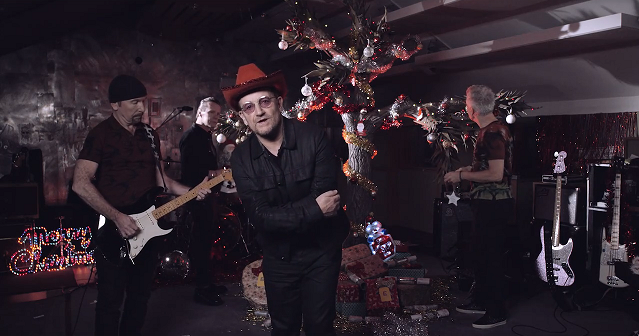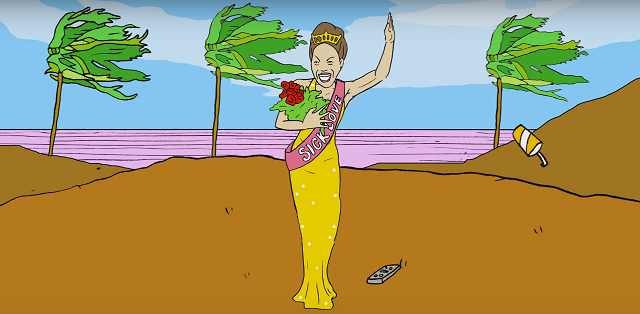U2: Trying To Throw Their Arms Around The World
They’re the biggest band left on Earth, but for U2, that’s not nearly enough. Inside their impossible quest
Finishing his last photo, he makes his way over to Coppinger Row, a restaurant around the corner. Our party has more or less taken over the place, commanding a bunch of tables pushed together. At the far end is Bono’s wife, Ali, who’s deep in conÂversation with the members of the ColoÂrado band the Fray, in town for a show. “My wife is romantically and socially and spiritually inclined in the direction of Joe from the Fray,” says Bono. “They’re just great friends.”
Bono is a highly enthusiastic host, bouncing around the table, getting cheerÂfully tipsy on a seemingly random selecÂtion of beverages: wine, a margarita, a flavored gin and tonic with various fruits f loating in it. When one of his guests confesses ignorance of the Irish trouÂbles, Bono happily offers a concise but decades-spanning history.
Well past midnight, champagne arrives, and Bono offers a series of toasts to his friends. “We want to welcome the Fray, who are clearly frayed at the edges as we speak,” he says. “And one thing I’ll say to you ”“ in Ireland, it’s in every writer’s diary: Beware of the cradle at the bottom of the stairs. That’s all I’ll say to you.” He sits down, but then there are more toasts: We drink to Bob Dylan, to Leonard Cohen. Late in the eveÂning, a shot of tequila appears in front of me, unbidden. (Any iTunes user could probÂably guess how it got there.)
As dinner winds down, Bono announcÂes, “The missus and I are off to do someÂthing unspeakable.” They adjourn to the restaurant’s front section, where they hold hands across a table while sharing a cigarette. It is, Bono recognizes, a moment almost sickening in its wholesomeness. What kind of self-respecting drunk rock star sneaks off to cuddle with his wife of 32 years?
“My ideas about love are probably very unÂromantic,” he tells me later, in a discussion about “Every Breaking Wave.” “I see love as a decision not made in the heat of the moment. I see it as an enduring thing that doesn’t deÂpend on feelings to verify it, though it’s great when they do. And, in the end, love is often DNA tricking you into making a much bigÂger commitment. It’s what happened to me, before I even knew what commitment was. I ended up as a young man in the arms of this young woman, in a world somewhat hostile to the concept of the childhood sweetheart and a first love.”
”˜Iris,” perhaps the most excruciÂatingly personal song in U2’s catÂalog, was one of the last Songs of Innocence tracks to take shape, coming together in the last hours of the sessions. It’s a song about Bono’s mom, who died when he was just 14. He reÂ
wrote the lyrics after being deeply affectÂed by the letter the late ISIS hostage James Foley passed on to his family through anÂother prisoner. “I realized,” he says, “that we will all be remembered by the least-profound moments. The simplest moÂments. In the letter he says to his brother, ”˜I remember playing werewolf in the dark with you.’
“If I make a swift exit, stage left,” Bono says, with a meditative sip of Guinness, “my family and friends won’t be thinking about debt cancellation or fighting for HIV/ AIDS medication, or U2 being on the cover of Rolling Stone, or 50 million people hearing Songs of Innocence. They might reÂmember some stupid face I made at breakÂfast. And that’s what I remember of my mother. Like being buried in the sand up to my head, or her saying, ”˜You’ll be the death of me.’ ”
The album is the closest thing Bono has come to therapy, something he’s managed to avoid his whole life, save for one week in his teens. “When I was a teenager, I had a viÂolent period,” Bono recalls. “I had an alterÂcation with a teacher where I might have, in front of the whole class, put him up against the blackboard and told him to stop picking on this one person in the class, which I realÂly couldn’t stand. So I was sent to this very clever woman and at the end of seven days, she said, ”˜Go home.’ ”
It’s bizarre, almost, that Bono is only now delving into his early life in his songs, on U2’s 13th studio album, at age 54. (As one old friend told him in an e-mail, “All this way to make your first album!”) And Bono being Bono, he has a follow-up album in mind: He hopes to put out Songs of ExpeÂrience as soon as 18 months from now. The idea, in theory, is to have the indoor Songs of Innocence tour jump outdoors when the companion album comes out. “We’re hoping Songs of Experience will be less about intiÂmacy,” says Clayton, “and more about a celÂebration of sorts.”
Bono has a habit of announcing unfinÂished albums, something he also did five years ago, telling me that U2 would quickÂly release a more meditative No Line follow-up from the same sessions, called Songs of Ascent. (That one has yet to surface, and it’s unclear how much work it would take to finÂish it.) “Songs of Experience has to feel like it’s justified, that it’s relevant,” says Clayton. “And if we don’t feel it’s very good, then I imagine we’ll just scrap it, and it’ll become something else.”
“I’ve grown to expect it from Bono,” says Mullen. “If he didn’t announce it, that would be the surprise. That’s what he does, that’s who he is.”
As if to prove that the album is truly in progress, Bono recites what seems to be the entire lyric of a song called “The Morning After Innocence” that’s built around diaÂlogue between his younger and older selves. “Lead me in the way I should go,” he’ll sing in the chorus, assuming it ever is released. “I’m running out of chances to blow/That’s what you told me, and you should know/ Lead me in the way I should be/Unravel the mystery of the heart and its defense/The morning after innocence.”
And, by the way, he’s still promising to release that other phantom album, now as the third of what he sees as a Songs trilogy. “Songs of Ascent will come,” he says. “And there are some beautiful songs.”
Back on the french riviera, U2’s rehearsal has died down, and Bono and I head back to the vilÂlas he and the Edge share along the coast. As a bodyguard steers us through dark, winding mountain roads, Bono ponÂders how long U2 can last, and what it might take for them to stop. “We’ve been living by a ”˜one crap album and you’re out’ rule,” he says, as we pass through the porous borÂder between Monaco and France. “There’s albums people like more than others, but nobody thinks we’ve made a lazy piece of work yet. But the question of ”˜how long’ still has to be asked ”“ and I don’t think it’s answered by ”˜until we fall over.’ We have to proceed with no sense of entitlement.”
Arriving at the properÂty, past a metal gate and an ancient-looking tunnel, we get out of the car. It’s a starless night, with a nearÂly full moon casting its sparÂkling ref lection over the Mediterranean. Bono ofÂfers a quick history of this retreat: Mullen and ClayÂton had a chance to share the purchase years ago, but were spooked by the then-dilapidated condition of the main house. Bono and the Edge bought the propÂerty for around $3 million ”“ it’s apparently worth far more now ”“ and originally intended to sell the big house, a pinkish-orÂange mansion. But as kids came along, and kept coming, this place became a haven for their families.
“The kids bring their friends, and we don’t know who’s their friends and who are our friends,” says Bono. “There’s music and mayÂhem and swimming and an actual life here.” He shows me to a cabana-like nook on the marble terrace, with pristine white couches facing the sea. Songs from a playlist heavy on 1970s Bowie play from invisible speakÂers. Inside, house staff have snacks ready in the kitchen. There’s an elevator if you don’t feel like climbing stairs.
It is, in short, paradise. Or at least not the sort of place that would, in normal huÂmans, breed the kind of existential hunger that might inspire years of obsessive recordÂing and rerecording. The members of U2 seem aware that there’s something almost pathological within their collective ethos that compels them to believe, against pretÂty much all historical precedent, that a rock band can still make new fans, record new hits and get better in their mid-fifties.
“We’re not fighting anybody else except ourselves,” says Mullen, sitting two weeks earlier in a restaurant overlooking a harbor in the Irish Sea. “So it is a really good quesÂtion: ”˜Why bother?’ Why not take three years off, go take care of your family? And then maybe get together and record something and go on the road and do a greatest-hits tour. And make shitloads of money, like evÂerybody else. Make an absolute fortune. No one will think ill of you. But, no. These guys will go into the studio for four years, cost them a fortune.
“Maybe we’re stupid. I don’t know,” Mullen continues, with a pause that all but dares me to express agreement. “Or maybe we’re really clever. And maybe we really care about what we do. I could easily accept going down in flames on this album ”“ if U2 would never reÂcord again, I’d go, ”˜OK.’ This is a really good record. To go down in flames on No Line on the Horizon ”“ that I was not prepared to do. So maybe that’s what this is about.”
For Bono, the answer is even simpler. “Most of our best work is fired up with the idea of ”˜If only people could hear this song,’ ” he says. He’s taken his sunglasses off, and direct contact with his blue-gray eyes is mildly unsettling. “And here’s a question for you: Why isn’t everybody like this? Why do we look mad beÂcause we want it like we alÂways have? Everyone else gets to play the ”˜been there, done that, sonny’ card. I don’t get it! I mean, some of the most incredible minds and sacred talents haven’t bothered their arse in years! They put out lazy work.
“But U2’s gone about this like it’s our first album. And as the gunpowder fades, there are songs there. Songs where we can get all our contemporaries and everyÂone in a room and say, ”˜This is what I’ve got.’ And if somebody comes up with one better than ”˜Every Breaking Wave,’ you know, let’s hear it.” Off in the distance, under the glowing moon, the ocean is completely still, not a wave in sight. Bono leans in, and reÂpeats himself: “It’s a better question, isn’t it? Why isn’t everyone like this?”







